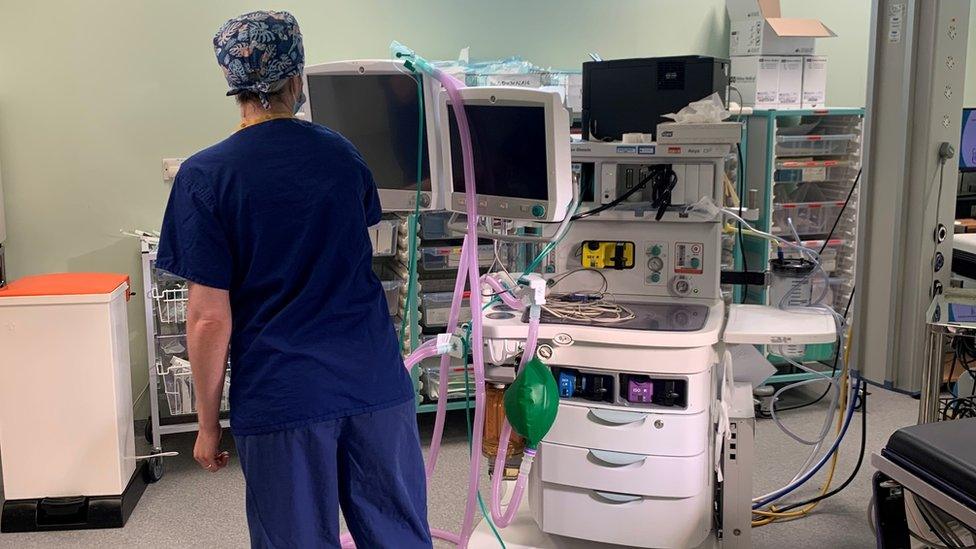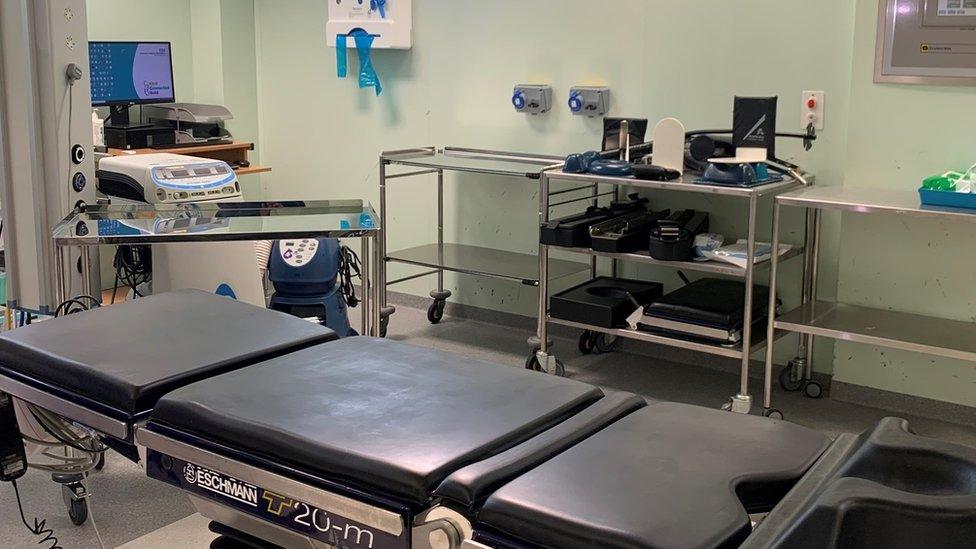The NHS’ 'first climate friendly' operation
- Published

The surgery was performed at Solihull Hospital
The NHS is a massive organisation and everything it does has an impact on our climate.
In fact, the activities of the NHS contributes to 6% of the UK's total carbon footprint. But climate change also directly costs it money, so reducing emissions isn't just green, it will also put more cash back into healthcare.
The numbers around healthcare are extraordinary. Believe it or not, just one year of kidney dialysis is equivalent to seven return flights between London and New York, external. And 4% of the NHS' climate change gasses come from the propellants in asthma inhalers alone.
But one of the big contributors to the NHS carbon footprint is surgery. Only 5% of patients in hospital go under the knife but surgery makes up for a quarter of the emissions from a typical trust. Reducing those emissions would help the NHS meet the climate targets it has set itself.
Now a team from University Hospitals Birmingham NHS Foundation Trust has carried out what it says is the first "net zero" operation where carbon emissions were reduced almost to nothing, with the rest mopped up with a bit of extra tree planting. The idea is to push the NHS to its green limits, see what we learn, and then try to roll it out across the whole organisation.
A host of changes were made to reduce the climate impact of the surgery. The team at Solihull Hospital used reusable gowns and recycled equipment where possible. The surgeons involved cycled or ran to work rather than using their cars. But the two big climate change contributors were the energy in running the theatre and the anaesthetic used to keep patients asleep.
Looking at the energy use it was a case of deciding if everything from lights to air conditioning needed to be on all the time - typically at the moment they are on overnight. And then also looking to make use of energy efficient options like led lighting.

The NHS contributes 6% of the UK's total carbon footprint
Anaesthetic gasses are in fact green house gasses and directly contribute to climate change when they get in the atmosphere. In the course of an operation, patients inhale the gases, then breathe them out into the operating theatre and they are then vented directly to the outside where the contribute to global warming.
But with this net-zero surgery the anaesthetist on the team didn't use gases at all. Instead she used liquid anaesthetic injected straight into the patient's veins. This isn't anything that unusual in the NHS and as long as people are trained and the right equipment is in place it's a switch that many surgical teams could make. But it obviously completely eliminates any gases getting into the environment.
It's a whole host of changes big and small that have allowed this operation to take place. In what the team at the trust believes to be a world first.
Much of what they've done seems obvious from the outside but in a big organisation like the health service, sometimes even the small changes can only happen after a lot of hard work across lots of different departments. From convincing other surgeons the changes are safe to finding the right person on the estates team who can actually turn off the lights overnight.
And at the end of everything, once the final carbon calculation was carried out, three trees were planted at the Solihull hospital site to soak up the remaining carbon generated. Now it's not really likely the NHS will start planting forests to deal with its emissions, so in the end, what the exercise will really result in is more low-carbon than net-zero carbon operations. But when scaled up over every theatre in every hospital that represents big change.
There are wider issues around the need to reduce emissions and the duty the NHS has to the community and to future generations - not just its patients now. But the NHS already spends £50m on "carbon permits"; a cost which will grow unless it finds ways to reduce emissions.
Greener operations won't just be better for the planet they could save a lot of much-needed money in the long term.

Follow BBC West Midlands on Facebook, external, Twitter, external and Instagram, external. Send your story ideas to: newsonline.westmidlands@bbc.co.uk, external
